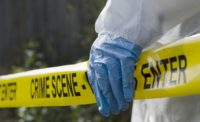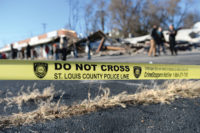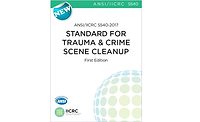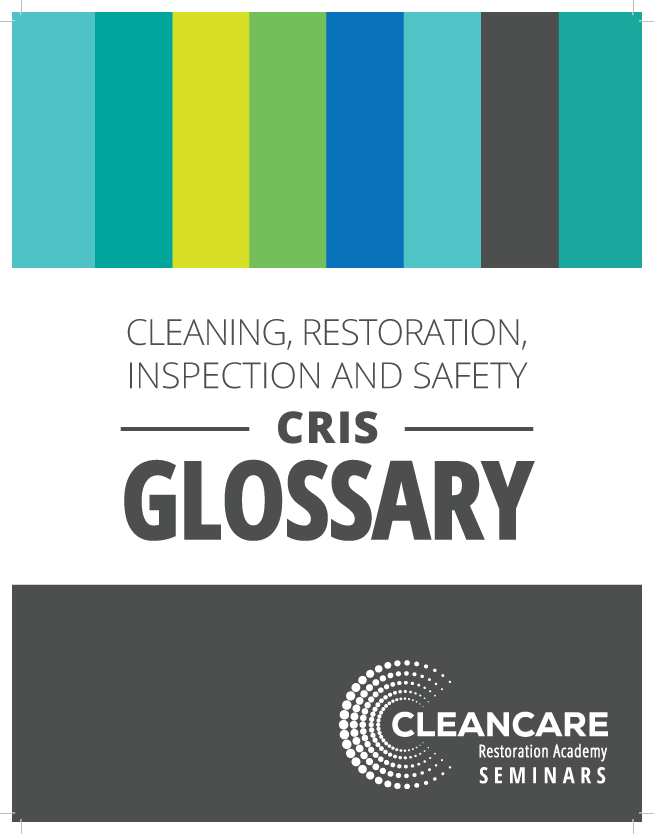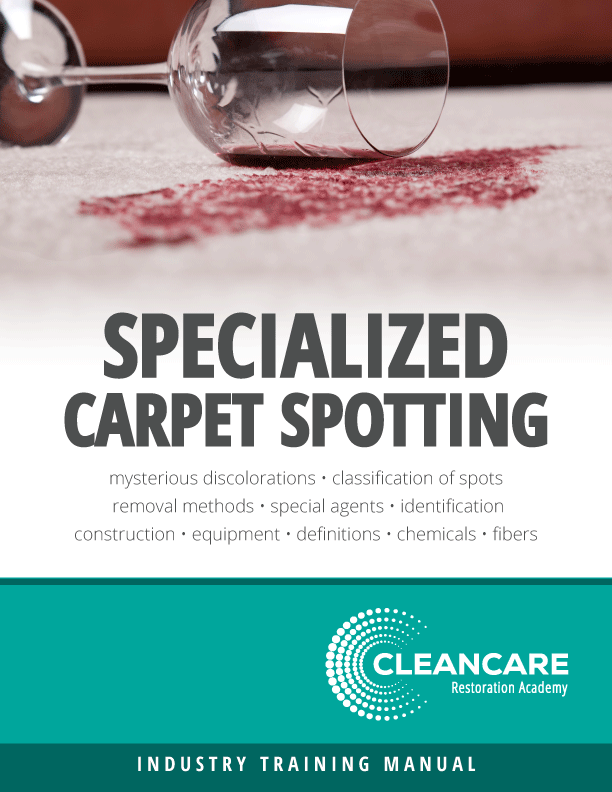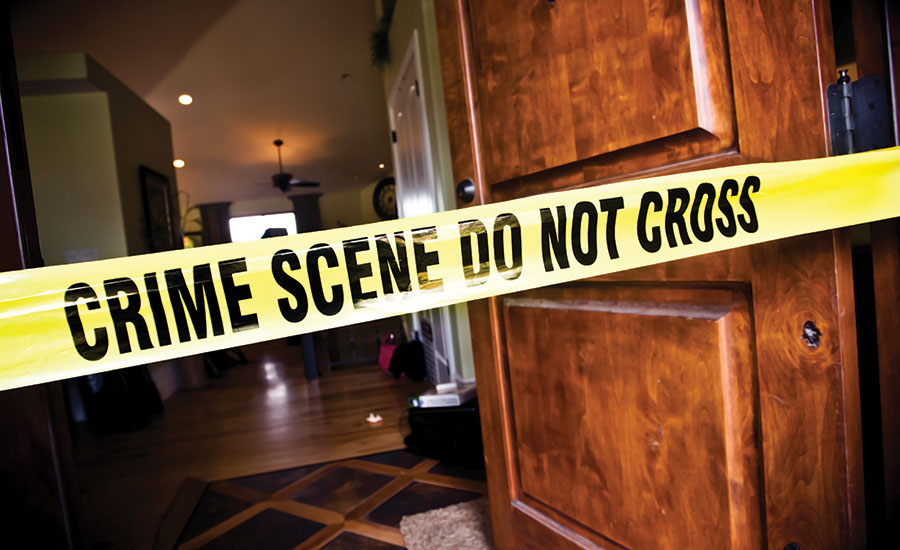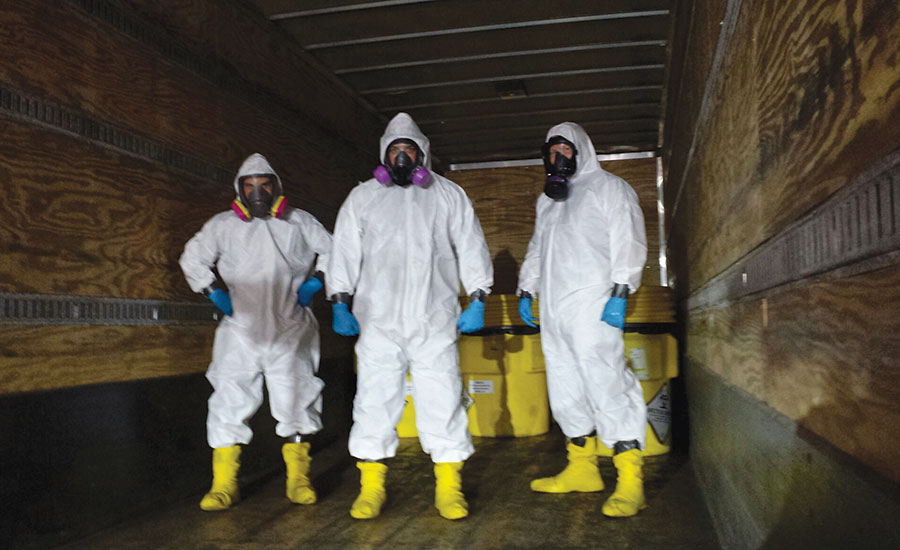Crime Scene Restoration: Not for the Faint of Heart
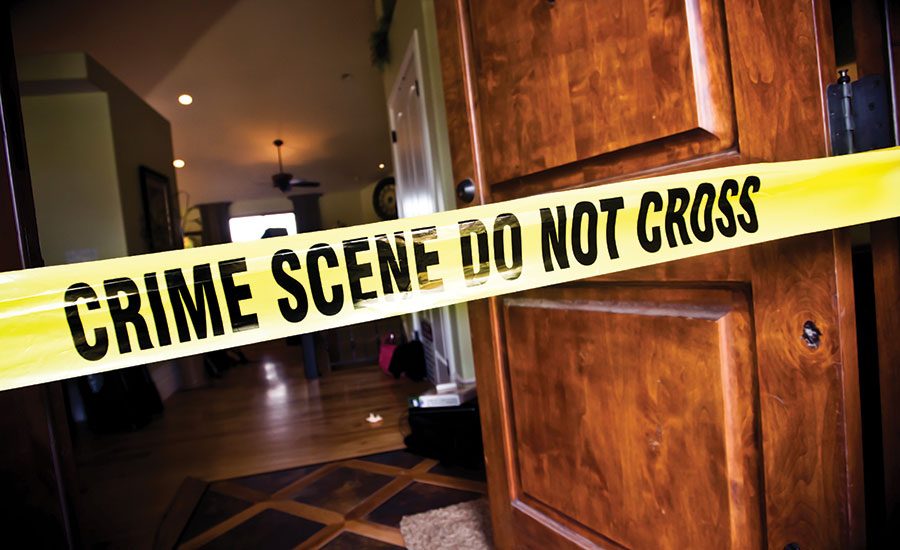
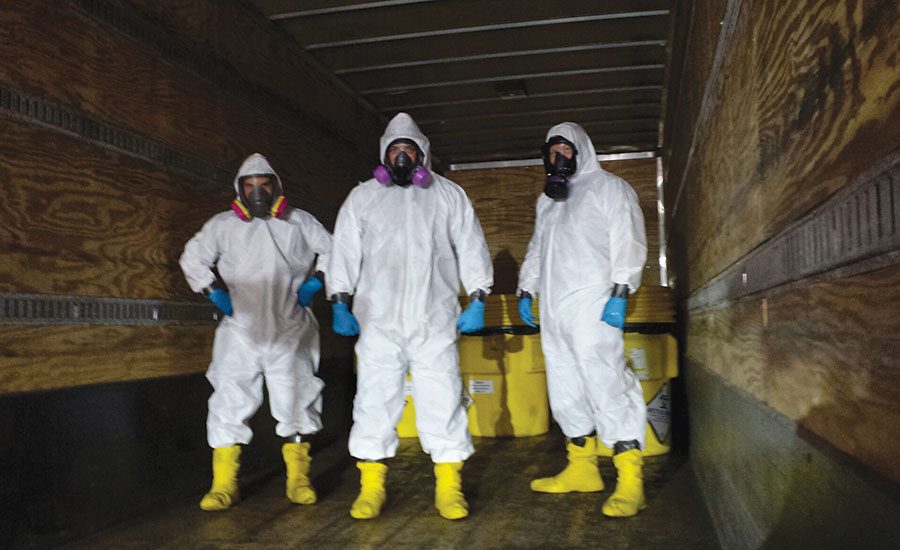
A team is fully geared up, ready for the next call to action. PPE’s are extremely important in crime scene remediation.
Photos Courtesy of CrimeSceneCleanup.com
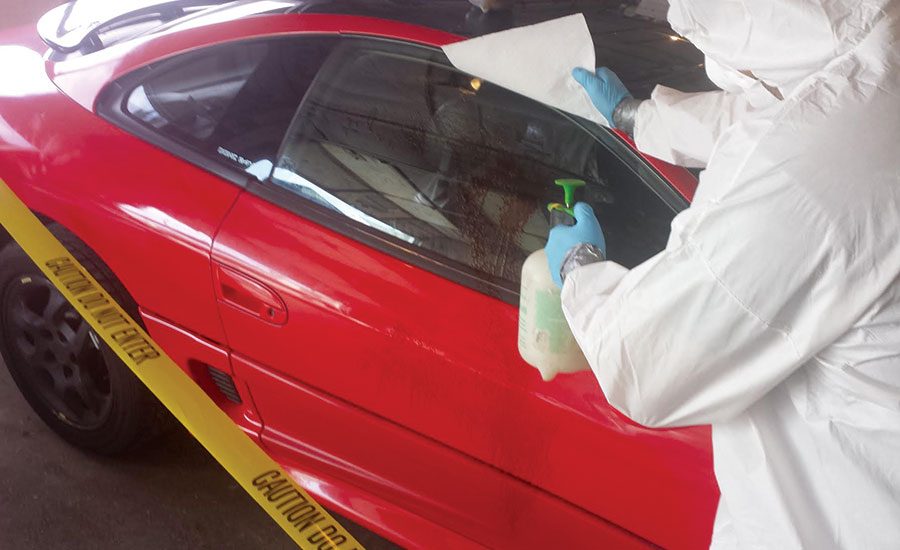
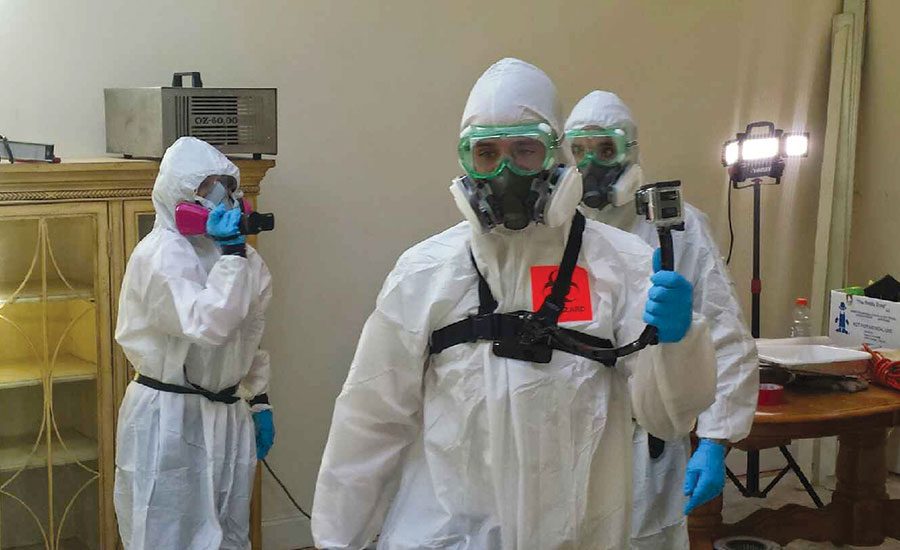

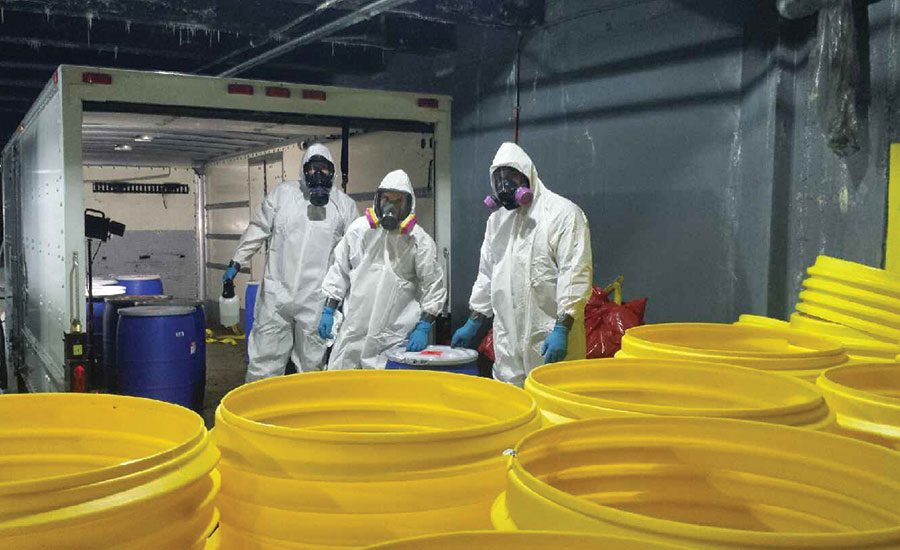
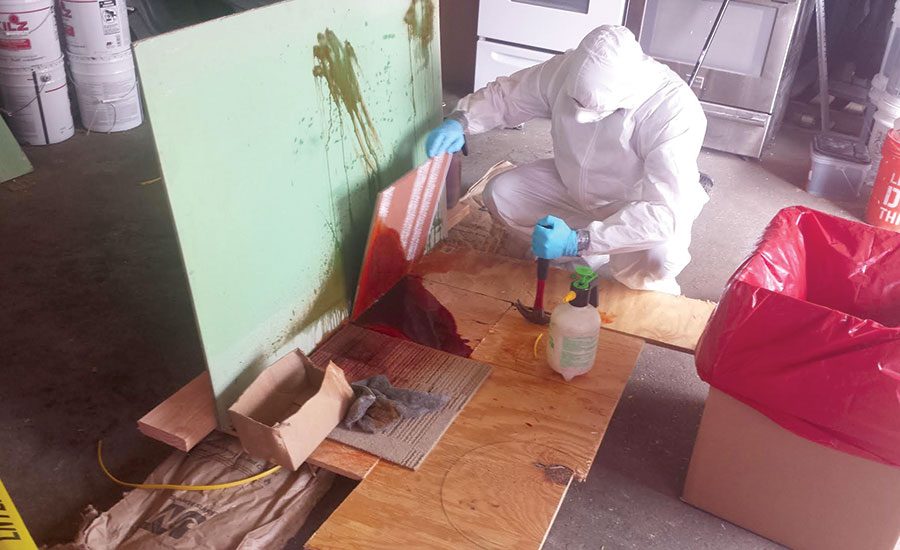
Using “stage” blood, crew members are trained on properly cleaning up blood at a crime scene that can easily seep through one surface, to another.







No matter the sector of the restoration industry you work in, it’s likely you meet people on their very worst day, almost every day. Any property loss is devastating for the families impacted, but what about when there’s another kind of loss – of human life – within a space.
Different organizations and the government are doing a better job of educating the public about the dangers of biological contamination. Gone are the days when a homeowner would spray a little vinegar water on a blood stain and pretend everything is OK. Similarly, law enforcement is increasingly aware of the dangers of biological matter like vomit, blood, etc. in their vehicles and on crime scenes, and taking more steps to ensure those contaminants are properly remediated on the surface, and below it.
That’s where companies like New York-based CrimeSceneCleanup.com are taking a more active role.
Growing through Education: Safety First
“We don’t charge the police department for remediation jobs, we do it free of charge,” said James Michel, CEO of CrimeSceneCleanup.com. “Anything related to our field… if it’s them or a family member impacted, there is no charge, and no insurance information is taken.”
Instead, Michel’s crews turn the remediation into a learning experience. For example, a crew will go to the police station to clean vomit out of a patrol car and walk the officers through every step of the process so they understand the stages, and the dangers if done improperly. When an officer had an HIV positive suspect spit blood on him, Michel’s company came in and did a bloodborne pathogen awareness course. By educating, word about their work has traveled.
Today, Crime Scene Cleanup covers 31 states, and is constantly growing. In 2015 alone, they bought nine larger competitors. There are more big things planned for 2016. More than 90 percent of their business is crime-scene related, handling multiple cleanups a day.
Like many of the industry’s experts and leaders, Michel has been in restoration since he was 17, specifically biohazard cleanup. As you can imagine, he takes training seriously. He holds a 501OSHA, the highest possible certification issued by the federal government.
“It allows me personally, I went to college for this and took courses, to teach OSHA outreach programs to people and certify them with the government,” said Michel. “We do a lot of training. A lot of companies do a 20 hour or 40 hour training, or a few days. We do a two month training course.”
Michel credits all that training to an impeccable safety record. They’ve only had one incident since being in business, and it was from a light fixture falling from a ceiling during a walkthrough.
When it comes to gear, it’s the standard: suits, booties, gloves. Plus, respirators. Everyone is fit-tested quarterly. In addition, crews go through regular physicals and drug testing, which in Michel’s words, is “mandatory, sporadic, and diligent.”
Hiring & Managing a Crew
So who’s going to wear all that gear? Hiring qualified technicians can be tough in any sector of the restoration industry. But finding people who can handle the daily demands of crime scene cleanup takes hiring to a whole new level.
Michel mostly hires former military personnel for the simple fact that, for better or worse, veterans know how to handle blood and gore. They also have impeccable work ethics, and are goal-oriented. Michel says for him, he’s never struggled to find good people and recognizes he’s fortunate in that area.
Employees are also not expected to act as robots and ignore the toll crime scene cleanup can cause physically and emotionally. Quarterly, Michel flies in all his managers from across the country to go over some of their harder cases and check in on everyone’s well-being. In early January, he was preparing to fly an entire team – not just managers – into New York to debrief after a particularly difficult job over the holidays that Michel said “shook the bones” of the whole team.
Michel simply said, “What goes on in this world sends chills down all of our spines.” But, in the same breath made it clear his company’s passion for helping people.
Crime Scene Cleanup works with several pastors who are also grief counselors. They are constantly available to cleanup teams, and also visit with victims during jobs when needed – sometimes even traveling across the country to do so. Cases involving children obviously cause the most trauma.
Protecting the Victim’s Family
“We do thousands of murders and suicides a year. Not hundreds, thousands,” Michel explained. If you want to know more than that, forget it. Michel firmly believes sharing case statistics is negative, and would hurt the victims they help. He doesn’t want his business to be based on statistics and the number of crime scenes they’ve cleaned up, but rather on the foundation of the good work they do.
If you visit any of Crime Scene Cleanup’s social media pages or website, you’ll also never see images from actual jobs. The images you’re seeing in this article have been used for training purposes.
Similarly, Michel never wants a family member to see crews at work. He said a family member of the victim is present at about 40 percent of the cleanup jobs, often just keeping watch over the home or building and the possessions inside. In his words, the family member “stands post.”
“I wish they were never there, for the fact that, our men and women are very careful when they’re cleaning, but we wear Tyvek suits because we’re not perfect,” Michel explained. “You know, blood does get on our outfits. That’s what they’re made for, they’re made to protect us. Of course, we never want the family to see us working.”
To physically protect family members who may choose to keep watch, they too are asked to put on a protective suit and gear like gloves, booties and a paper mask. They’ll also be asked to stay in a certain area. Michel understands the desire for family members to sometimes be present during the process.
“I understand. It’s sensitive, it’s a very, very sensitive time in peoples’ lives, you’re letting in a complete stranger you don’t know, to come in and remove items from the home,” he said. But, like any good restoration company, his crew is honest. Once, a worker found seven figures in cash inside a home and without a second thought, notified Michel so they could get in touch with the rightful owners.
The Biggest Challenges
Michel said one of the biggest challenges he faces is competitors “doing what they do.”
“The non-licensed, the non-sanctioned entities that do horrible things with their jobs, it’s something that I take very personally,” Michel said. On many occasions, Crime Scene Cleanup has been called to fix what another company has done wrong.
Crime Scene Cleanup crews carefully box up biohazard items, and they’re taken to an incinerator. Throwing, for example, a bloody mattress to the curb for trash pick is an obvious no-no.
Michel used a New York City crime scene as an example of proper disposal. First, the contaminated items are put in a red bag, then double bagged, then pre-sprayed, then properly sealed. From there, the bags are put into a box that’s a specific size for the incinerator. That box is transported to the incinerator for destruction, which is costly. While you can drop garbage off at a dump for just a few dollars a ton, it’s as much as $2 or $3 a pound for the incinerator. Plus, they must have a complete manifest that’s issued to people at the place where the cleanup took place, Crime Scene Cleanup, the local or state environmental department, and the records must be held for 20 years.
The other big challenge: cats.
“The amount of ammonia they produce… there is nothing worse than cats,” remarked Michel. “It’s a never-ending battle. The odor is almost impossible to get out, and the cost and time to do it is massive.”
Another challenge is working with victims with mental illnesses. Michel says it’s an uphill battle every time.
Plus, it takes an emotional toll on the crew.
“I’ve been on thousands of cleanup jobs,” he said. “I can write down details of every single one. It never leaves you, no matter what kind of therapy we offer.”
Final Advice
“Until you are fully licensed, insured, and bonded to do everything, please trust the professionals to do this,” Michel said. “There are certain jobs where you can’t mess up, this is one of them. If you don’t do it right, you should be ashamed of yourself.”
He also says for those in this line of work, it helps when your team feels like family. At CrimeSceneCleanup.com, Michel’s teams eat meals together, gather around the same table, and play together.
“God needs to give us the strength to get through these days,” he said.
Looking for a reprint of this article?
From high-res PDFs to custom plaques, order your copy today!




